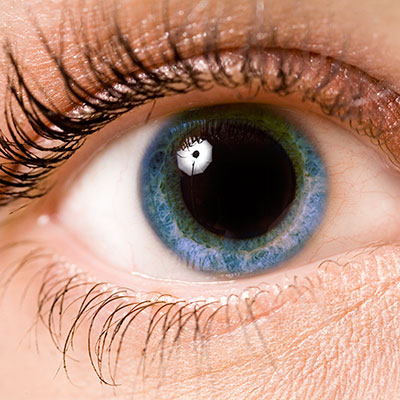How your body responds to love
by Lindsay TigarButterflies in your stomach, a racing heartbeat—you probably remember those symptoms well from your first middle school crush. As an adult, they're actually your body's subtle clues that you're falling in love (or lust, at least). At the start of a relationship, a series of truly fascinating chemical reactions occur throughout your nervous system and hormones. From the first time you meet to climbing under the sheets, here's what's happening to your body as you fall in love.

Being in love is like a drug addiction
Kesha wasn't too far off when she described love as a drug, according to a 2010 study conducted at Rutgers University. Researchers concluded that falling in love is much like the sensation of feeling addicted to drugs with the release of euphoria, including brain chemicals like dopamine, oxytocin, adrenaline, and vasopressin. Kat Van Kirk, PhD, a clinical sexologist and licensed marriage and family therapist, says these chemicals are released throughout different points of attraction, and help bond you with your partner. Like drugs, the more time you spend with this person, the more addicted you become, she says.
It's also like being drunk
Having a few too many glasses of wine makes you less inhibited, fearful, and anxious, and more aggressive and boastful—and so does oxytocin, the "love hormone," according to a University of Birmingham study. Researchers pooled existing research into the effects of both oxytocin and alcohol and although they impact different parts of the brain, they have similar outcomes.
Your cheeks flush, palms sweat, and heart races
Before a big date, you might notice your heart rate tick up and your hands get sweatier. It's not just a nervous tick that causes your anxiety to rise; it's actually the stimulation of adrenaline and norepinephrine, says Dr. Kirk. "This can lead to having a physical sensation of craving and the desire to focus your attention on that specific person," she says.
Your pupils dilate
When you're attracted to someone—sitting across from you at the bar, on the street, laying in bed together—there is a stimulation in your nervous system's sympathetic branch, which causes your eyes to dilate, says Dr. Kirk. (Go ahead, you can test it with your partner—it's fun!)You may feel a little sick
It's normal to lose your appetite or feel uneasy when you've just started seeing someone new. That's your body's way of telling you that you really like that person. "Lovesickness may actually be the stress hormone cortisol contracting the blood vessels in your stomach, making you feel sick," Dr. Kirk says. This usually fades over time as you become more comfortable with your boyfriend or girlfriend—but could also partially explain why many brides and grooms feel like they can't eat at their wedding.Being in love might give you superpowers
Ever heard stories of panicked moms lifting cars off their trapped children? While it might seem insane that the combination of love and fear can give you sudden superhuman strength in an emergency, anecdotal evidence suggests it really can happen. (It's pretty much impossible to scientifically research this phenomenon, called hysterical strength, because it's difficult to replicate those conditions for a study.) It's not just parents who have experienced hysterical strength; people who are in love have, as well. "The oxytocin released in your system when you fall in love can actually increase your tolerance for physical pain," Dr. Kirk says. Move aside, Prince Charming—love will save the day.
You won't be able to keep your eyes off your partner
There's a scientific reason why you have photos of your love set as your smartphone background or framed on your desk. The desire to literally look at your partner's face comes from the brain's release of dopamine, says Dr. Kirk. "This is the same effect on the brain as taking cocaine because it stimulates the desire/reward response related to intense pleasure," she says. In other words, when you scroll through photos from your vacation together, you get a surge of energy, as your desire is being fulfilled.Your voice might actually get higher
Once you're past that crush stage and you're deepening your connection and commitment to your partner, you might notice other odd changes in your body—including your voice getting higher (yes, really). According to a study published in 2011 in the Journal of Evolutionary Psychology, researchers found that when women spoke to men they were more attracted to physically, their voice tended to get higher and more feminine. So if you're a bit softer with your partner than you are with your co-worker who keeps missing your deadlines, blame it on love.
You will worry when they're not around
When we're separated from our partner for brief or extended periods of time, we respond like a drug addict who is coming off of their addiction, says Serena Goldstein, a naturopathic doctor in New York City. "Corticotrophin releasing factor is increased as part of a stress response when we are away from our partner, contributing to anxiety and depression," she says. Those couples who are in long distance relationships learn to cope with this feeling, often through developing attachments to their partner's voice as a way to stay connected to him or her.
Falling in love may mess with your hormones
During the honeymoon phase of a relationship—the first one to two years when you go ga-ga every time you see your sweetie—your hormones go haywire. According to a 2004 study published in Psychoneuroendocrinology, cortisol (the stress hormone) increases in both men and women. And during this time, testosterone, the male sex hormone, decreases in men and increases in women.
Love can literally break your heart
You can die of a broken heart—it's a scientific fact, according to the American Heart Association. The scientific term is "stress-induced cardiomyopathy" and it can strike even the healthiest person when their stress hormones surge during an emotionally stressful event, such as the death of a partner, divorce, or even a bad breakup. Symptoms often mimic those of a heart attack and include shortness of breath, irregular heartbeat, and chest pain. While broken heart syndrome can cause permanent damage to the heart and, in rare cases, even death, the good news is that most cases are treatable and can be fully resolved within a few weeks.
Your sex drive is the highest at the very beginning
At the beginning of a relationship, couples can't keep their hands off each other, but it can be tough to keep that spark alive long-term, especially for women, according to a study published in the Journal of Sex & Marital Therapy. Researchers from the University of Geulph in Ontario, Canada surveyed 170 men and women in monogamous heterosexual relationships about relationship satisfaction, sexual satisfaction and sexual desire. Researchers found that although the guys' sexual appetite held steady over time, women experienced a .02 drop on the Female Sexual Function Index for every month they remained in a relationship. If you start to feel your sex drive starting to cool, try these everyday libido-boosting habits to crank it back up.
You may put on a few pounds
You'll hear jokes that people "let themselves go" when they're in a happy relationship, and there may be some truth to that stereotype. In a 2012 review in the Journal of Obesity, researchers found that people tend to gain weight as they settle into marriage. Another study found that after moving in with a man, women tend to eat more high-fat, high-sugar foods, and further research found that newly married young women gained 24 pounds in the first five years after getting married. Cynthia Sass, MPH, RD, Health's contributing nutrition editor, sees this happen firsthand to many of her clients, and has five tips for beating relationship pudge.
If you get married, you may live a longer, healthier life
Tying the knot may lengthen your life. According Duke University Medical Center study, those who entered their 40s married had fewer risk factors for premature death than those who were divorced or never married. Another study from NYU Langone Medical Center in New York found that both married men and women may have stronger hearts than those who've never walked down the aisle. Men especially have stronger hearts thanks to their wives, with 5% lower odds of any vascular disease, according to the research.
It may strengthen a man's bones
More good news for men who decide to couple up: a UCLA study found that men in stable relationships or marriages after the age of 25 have stronger bones. But the study had one catch: only those with supportive women in their lives actually saw the benefits from the long-term relationship. Those with ladies who weren't as loving or emotionally supportive didn't reap the same bone-building rewards.
You might have trouble sleeping
Staying awake dreaming of that Tinder match date that went surprisingly well? Those feel-good crush-like symptoms may disrupt your sleep. According to a study of adolescents, when you're in those initial stages of euphoria, you feel more energized and positive in the early morning and evenings, causing you to not sleep as well, or have restless sleep. Dr. Kat says that all of those hormones bouncing around when you're thinking about your could-be relationship can also affect your ability to focus during the day, too.
Your creativity may be sparked
Though many famous writers have credited depression as the source of their inspiration, a 2015 study published in the Journal of Family Issues found that when you're in a relationship, your creativity may be ignited. Why? Researchers concluded that many people in love start to focus on the long-term, as opposed to the short-term, giving them a more holistic approach to their projects and passions, changing the way they process information. In other words, when you're dating, you're overanalyzing, but when you're in love, you allow yourself to dream a little more.
It'll make you more sexually adventurous
Penn State sociologists who interviewed women in Pennsylvania, New Jersey, and New York found that when they're in a committed relationship, women are more keen to try something new—including in the bedroom. It also makes the whole experience of getting it on overall more satisfying for women, and could make them more open to experimenting. Good news for dudes who are willing to commit!
It can ease chronic pain
A passionate, all-consuming relationship may work just as well as medication at easing chronic pain, according to a 2010 Stanford University School of Medicine study. Intense feelings of love
activate the same areas of the brain as painkillers, say researchers.
Doctors aren't quite ready to prescribe love affairs as replacements for
drugs, but are optimistic that understanding how neural-reward pathways
triggered by love will help them develop new methods to treat pain.







没有评论:
发表评论